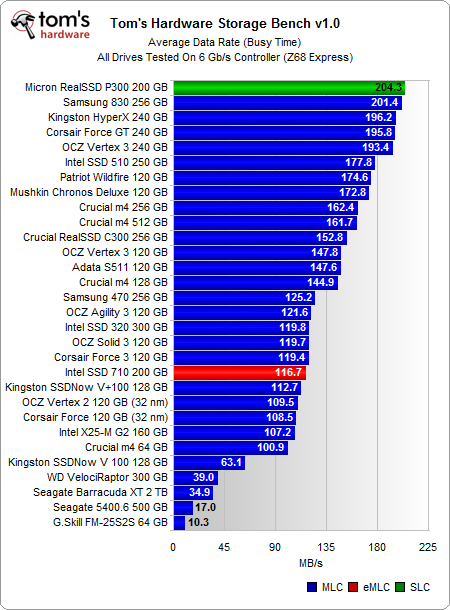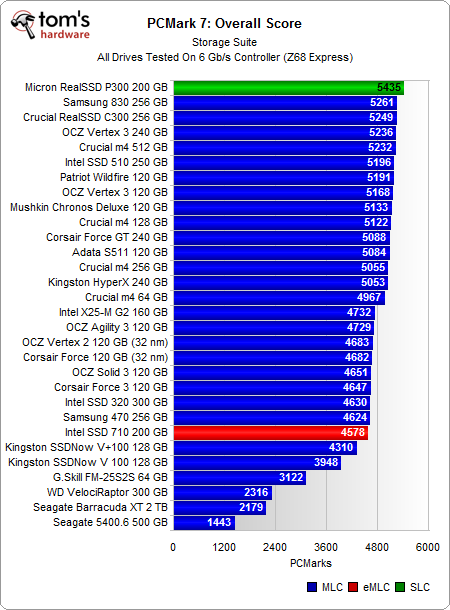Intel SSD 710 Tested: MLC NAND Flash Hits The Enterprise
Benchmark Results: Storage Bench v1.0 & PCMark 7
While Intel's SSD 710 isn't a consumer drive, PCMark 7 and our own Storage Bench v1.0 provide a quick and dirty way to examine storage performance. If you're unfamiliar with Storage Bench v1.0, we'd suggest that you read page three and four of Second-Gen SandForce: Seven 120 GB SSDs Rounded Up.
The performance specs provided for the SSD 320 and 710 are remarkably close, which is why it isn't too surprising to see similar rankings. The 710 only falls behind the 320 by a small margin, which we'd attribute to the lower random write spec inherent to eMLC NAND. However, compared to Micron's SLC-based P300, Intel's latest enterprise SSD falls far behind.
While we have enthusiast-oriented drives in this chart for comparison, the SSD 710 isn't an enthusiast product. We get good perspective on how vendors balance performance and reliability, though, in adding drives that are faster, less expensive, but ultimately unsuited for enterprise duty to the results list.
Get Tom's Hardware's best news and in-depth reviews, straight to your inbox.
Current page: Benchmark Results: Storage Bench v1.0 & PCMark 7
Prev Page Test Setup And Firmware Notes Next Page Benchmark Results: 4 KB Random And 128 KB Sequential Performance-
whysobluepandabear TLDR; Although expensive, the drives offer greater amounts of data transfer, reliability and expected life - however, they cost a f'ing arm and a leg (even for a corporation).Reply
Expect these to be the standard when they've dropped to 1/3rd their current price. -
RazorBurn To some companies or institutions.. The data this devices hold far outweighs the prices of this storage devices..Reply -
nekromobo I think the writer missed the whole point on this article.Reply
What happens when you RAID5 or RAID1 the SSD's??
I don't think any enterprise would trust a single SSD without RAID. -
halcyon __-_-_-__with the reliability those have they will never ever find their way into any serverMy Vertex 3 has been very reliable and I'm quite satisfied with the performance. However, I've heard reports that some, just like with anything else, haven't been so lucky.Reply -
toms my babys daddy I thought ssd drives were unreliable because they can die at any moment and lose your data, and now I see that they're used for servers as well? are they doing daily backups of their data or have I been lied to? ;(Reply -
halcyon toms my babys daddyI thought ssd drives were unreliable because they can die at any moment and lose your data, and now I see that they're used for servers as well? are they doing daily backups of their data or have I been lied to? ;(SSDs are generally accepted to be more reliable than HDDs...at least that's what I've been lead to believe.Reply -
Onus halcyonSSDs are generally accepted to be more reliable than HDDs...at least that's what I've been lead to believe.Yes, but when they die, that's it; you're done. You can at least send a mechanical HDD to Ontrack (or a competing data recovery service) with a GOOD chance of getting most or all of your data back; when a SSD bricks, what can be done?Reply
-
CaedenV nekromoboI think the writer missed the whole point on this article.What happens when you RAID5 or RAID1 the SSD's??I don't think any enterprise would trust a single SSD without RAID.The assumption is that ALL servers will have raid. The point of this article is how often will you have to replace the drives in your raid? All of that down time, and manpower has a price. If the old Intel SSDs were about as reliable as a traditional HDD, then that means that these new ones will last ~30x what a traidional drive does, while providing that glorious 0ms seek time, and high IO output.Reply
Less replacement, less down time, less $/GB, and a similar performance is a big win in my book.
toms my babys daddyI thought ssd drives were unreliable because they can die at any moment and lose your data, and now I see that they're used for servers as well? are they doing daily backups of their data or have I been lied to? ;(SSDs (at least on the enterprise level) are roughly equivalent to their mechanical brothers in failure rate. True, when the drive is done then the data is gone, but real data centers all use RAID, and backups for redundancy. Some go so far as to have all data being mirrored at 2 locations in real time, which is an extreme measure, but worth it when your data is so important.
Besides, when a data center has to do a physical recovery of a HDD then they have already failed. The down time it takes to physically recover is unacceptable in many data centers. Though at least it is still an option.

